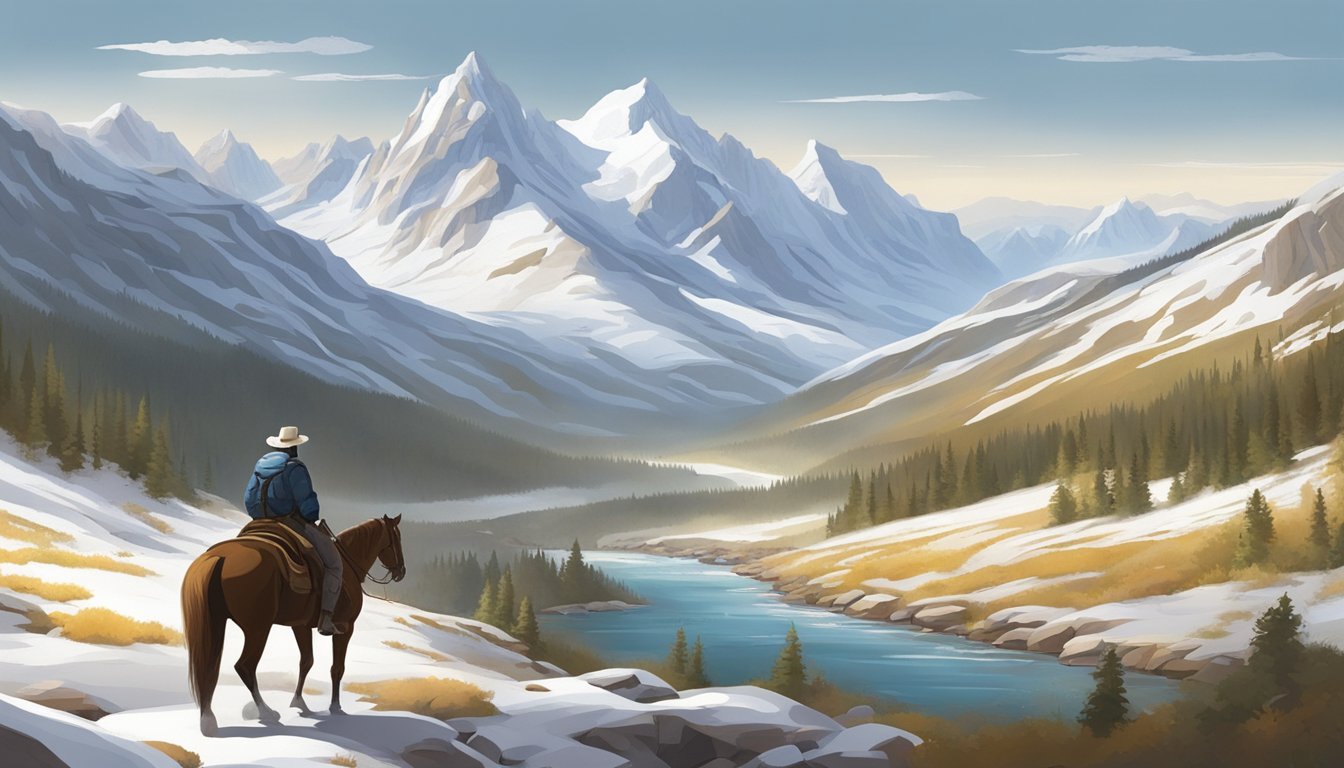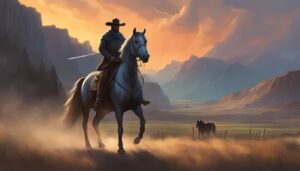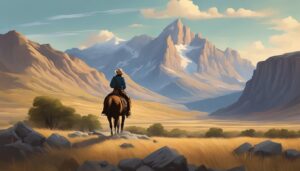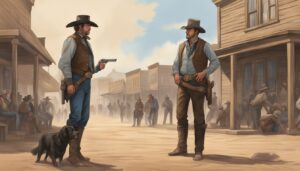The American West has long captured the imagination of audiences through its larger-than-life characters and rugged landscapes. Two iconic figures that epitomize the Western hero archetype are John Dutton from the TV series “Yellowstone” and Jeremiah Johnson from the 1972 film of the same name. Both men embody the spirit of independence, resilience, and frontier toughness that define the genre.
John Dutton, portrayed by Kevin Costner, is the patriarch of a powerful ranching family in Montana. He fights to protect his vast landholdings from numerous threats, showcasing his strategic mind and unwavering determination. Dutton’s impressive command over his empire and ability to navigate complex political and business landscapes make him a formidable modern Western hero.
Jeremiah Johnson, played by Robert Redford, represents a more traditional Western hero. Based on the life of real-life mountain man John “Liver-Eating” Johnson, the character survives harsh wilderness conditions, battles Native American tribes, and carves out a solitary existence in the Rocky Mountains. His remarkable survival skills and adaptation to frontier life highlight a different kind of strength and resourcefulness.
Protagonist Backgrounds

John Dutton and Jeremiah Johnson come from vastly different origins that shaped their journeys as Western heroes. Their backgrounds provide crucial context for understanding their motivations and actions.
John Dutton’s Genesis
John Dutton’s story begins with his ancestors in the late 19th century. The Yellowstone prequel series 1883 introduces a young John Dutton as part of the family’s westward migration. His character arc spans generations, culminating in the modern-day Yellowstone series.
Kevin Costner portrays the present-day John Dutton, a powerful Montana rancher. Dutton’s deep-rooted connection to the land stems from his family’s century-long presence in the region. This history fuels his fierce determination to protect the Dutton legacy.
Taylor Sheridan’s interconnected Yellowstone universe, including 1923, further explores the Dutton family‘s past. These prequels provide insight into the trials and tribulations that shaped John’s worldview and values.
Jeremiah Johnson’s Origins
Jeremiah Johnson’s background is rooted in historical fact, inspired by the life of John “Liver-Eating” Johnson. Born in New Jersey around 1824, Johnson left his life as a sailor to become a mountain man in the American West.
Johnson’s journey into the wilderness was driven by a desire for solitude and adventure. He embraced the harsh realities of frontier life, developing survival skills and a deep connection to nature.
Unlike John Dutton’s multi-generational saga, Jeremiah Johnson’s story focuses on his personal transformation from outsider to legendary mountain man. His experiences with Native American tribes and fellow trappers shaped his character and reputation.
Johnson’s background as a real-life figure adds a layer of authenticity to his portrayal as a Western hero. His origins represent the quintessential American frontier spirit of self-reliance and adaptation.
Character Analysis

John Dutton and Jeremiah Johnson embody complex Western heroes with multifaceted personalities. Their character depths stem from their experiences, motivations, and relationships.
John Dutton’s Character Complexity
John Dutton, portrayed by Kevin Costner, is the patriarch of the Dutton family in Yellowstone. His character blends rugged determination with inner turmoil. John’s unwavering commitment to preserving his family’s legacy and vast Montana ranch reveals deep-seated motivations.
His relationships with his children – Beth, Jamie, and Kayce – showcase his complex family dynamics. John’s interactions with Rip Wheeler, his loyal ranch hand, further illustrate his capacity for both ruthlessness and compassion.
As a neo-Western protagonist, John Dutton often toes the line between hero and anti-hero. His actions, while aimed at protecting his land and family, sometimes venture into morally ambiguous territory.
Jeremiah Johnson’s Character Depth
Jeremiah Johnson, based on the real-life mountain man John Johnston, demonstrates remarkable character evolution throughout his story. Initially seeking solitude in the wilderness, Johnson develops into a skilled survivalist and respected figure among both Native Americans and fellow trappers.
His character depth is evident in his adaptability to the harsh mountain environment and his growing understanding of Native American cultures. Johnson’s relationships, particularly with his adopted Native American family, reveal his capacity for love and loyalty despite his preference for isolation.
Johnson’s journey from novice mountain man to legendary figure showcases his resilience and personal growth. His character embodies the spirit of the American frontier, blending self-reliance with a deep connection to the natural world.
Narrative Arc

John Dutton and Jeremiah Johnson follow distinct paths in their respective stories. Their journeys reflect contrasting motivations and challenges within the Western genre.
John Dutton’s Quest for Power
John Dutton’s narrative in Yellowstone centers on maintaining control of the Yellowstone Ranch. He faces constant threats from developers, politicians, and rival ranchers. Dutton’s actions often blur ethical lines as he uses manipulation, intimidation, and even murder to protect his legacy.
His relationships with his children are complex, as he grooms them to continue his legacy. The struggle for power extends beyond land ownership, encompassing political influence and economic dominance in Montana. Dutton’s arc is marked by a growing isolation as he sacrifices personal connections for the sake of the ranch.
Jeremiah Johnson’s Survival and Redemption
Jeremiah Johnson’s story is one of personal transformation in the wilderness. He begins as a Mexican-American War veteran seeking solitude in the mountains. Johnson faces harsh challenges, including conflicts with Native American tribes and the unforgiving natural environment.
His journey involves learning survival skills and adapting to mountain life. Johnson’s encounters with other trappers and Indigenous people shape his character. He experiences loss and seeks redemption through his actions.
Unlike Dutton’s quest for power, Johnson’s narrative focuses on finding inner peace and harmony with nature. His arc culminates in becoming a respected figure in the frontier, known for his resilience and wisdom.
Thematic Elements

Death and the complex relationship between humans and nature play pivotal roles in shaping the narratives of both John Dutton and Jeremiah Johnson. These elements influence the characters’ motivations and choices throughout their respective stories.
The Role of Death in Shaping Destiny
Death looms large in the worlds of John Dutton and Jeremiah Johnson. For John, the loss of family members, including his wife and eldest son, fuels his determination to protect the Yellowstone ranch at all costs. This drive leads to ruthless decisions and power struggles, especially evident in Season 5.
Beth Dutton, John’s daughter, carries the weight of her mother’s death, which shapes her fierce loyalty and sometimes destructive behavior. The threat of death constantly surrounds the Duttons, influencing their actions and relationships.
Jeremiah Johnson faces death repeatedly in the wilderness, from encounters with hostile tribes to the harsh elements. These experiences harden him and deepen his connection to the land.
Duality of Man and Nature
Both protagonists embody the complex relationship between humans and the natural world. John Dutton sees himself as a steward of the land, fighting to preserve a way of life tied to Montana’s rugged landscape. This often puts him at odds with modern development and changing times.
Jeremiah Johnson becomes increasingly attuned to nature as he adapts to life in the mountains. His journey represents a shift from conquering the wilderness to becoming part of it. This transformation highlights the delicate balance between human survival and respect for the natural order.
The characters’ struggles with nature mirror their internal conflicts, showcasing the duality of their roles as both protectors and exploiters of the land they inhabit.
Cultural and Social Impact
Yellowstone and Jeremiah Johnson have left indelible marks on American culture, shaping perceptions of the West and its values. Both narratives have influenced how audiences view frontier life and rugged individualism.
Influence on Western Genre
Yellowstone revitalized the Western genre for modern audiences. The show blends traditional Western elements with contemporary issues, attracting a broad viewership. Its success sparked a resurgence of Neo-Western content across various platforms.
John Dutton’s character embodies the evolution of the Western hero, adapting to modern challenges while clinging to traditional values. This portrayal resonates with viewers seeking a connection to America’s frontier spirit.
Jeremiah Johnson, while older, established a template for the lone mountain man archetype. The film’s depiction of wilderness survival and Native American interactions influenced subsequent Western narratives.
Representation of American Values
Yellowstone reflects current American sociopolitical tensions. The show explores themes of land ownership, family legacy, and the clash between tradition and progress. John Dutton’s struggles mirror real-world conflicts over resources and cultural preservation in the American West.
The series highlights the complexities of modern ranching, showcasing the cattle industry’s importance to Western identity. Taylor Sheridan’s storytelling captures the essence of rural America’s challenges in the 21st century.
Jeremiah Johnson represents a more romanticized view of American individualism and self-reliance. The character’s journey emphasizes personal freedom and harmony with nature, values that continue to resonate with audiences seeking escape from urban life.
Critical Reception and Legacy

John Dutton and Jeremiah Johnson have left indelible marks on Western culture, captivating audiences and critics alike. Their portrayals have shaped perceptions of frontier life and rugged individualism in American media.
Critics’ Perspectives on John Dutton
Kevin Costner’s portrayal of John Dutton in Yellowstone has garnered widespread acclaim. Critics praise his nuanced performance as the patriarch of the Dutton family. The character’s complex moral code and fierce dedication to preserving his land resonate with viewers.
Taylor Sheridan’s writing receives particular recognition for its depth and authenticity. John Dutton’s struggles with family, politics, and changing times are seen as reflective of modern Western issues.
Season 5 of Yellowstone further solidified John Dutton’s status as a memorable Western figure. His evolution from rancher to governor showcased the character’s adaptability and political savvy.
Public Perception of Jeremiah Johnson
Jeremiah Johnson, based on the life of mountain man John “Liver-Eating” Johnson, has become a cult classic. The film’s portrayal of solitude and survival in the wilderness struck a chord with audiences.
Robert Redford’s performance is widely regarded as one of his best. His stoic depiction of Johnson embodies the mythic ideal of the American frontiersman.
The character’s journey from novice to seasoned mountain man resonates with themes of self-reliance and personal growth. Jeremiah Johnson’s respect for Native American cultures and his eventual integration into their way of life adds depth to his legacy.
The film’s stunning cinematography and minimal dialogue contribute to its enduring appeal. Jeremiah Johnson remains a touchstone for authentic Western storytelling.
Conclusion

John Dutton and Jeremiah Johnson stand as iconic Western heroes, each impressive in their own right. Dutton’s modern-day struggles to maintain control of his vast ranch showcase the evolving challenges faced by ranchers in the American West. His complex family dynamics and political maneuvering add depth to his character.
Johnson’s tale of survival and adaptation in the wilderness represents a more traditional Western narrative. His journey from novice to skilled mountain man highlights the rugged individualism often associated with frontier life. Both characters embody resilience and determination in the face of adversity.
The Neo-Western genre, exemplified by Yellowstone, brings classic Western themes into a contemporary setting. This allows for exploration of modern issues like land development and corporate interests alongside timeless conflicts over territory and survival.
While Dutton relies on a network of allies including family members and local authorities, Johnson’s story is one of solitude and self-reliance. This contrast highlights different aspects of the Western hero archetype. Ultimately, both characters leave lasting impressions as formidable figures in Western storytelling.



